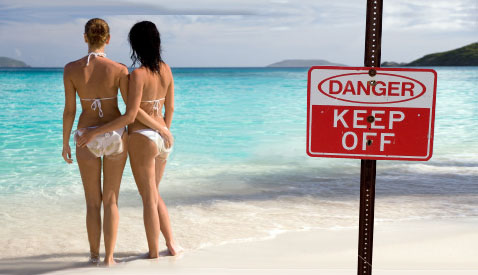Ah, the honeymoon. It’s certainly not just another vacation. After all of the effort and planning that went into pulling off the perfect wedding, you and your love deserve rest, relaxation and the romantic experience of a lifetime. But same-sex couples seeking adventure abroad should think twice before casually booking that African safari, tour of the Great Pyramids or exotic Pacific island retreat.
According to the International Lesbian, Gay, Bisexual, Trans and Intersex Association (IGLA), a global federation that campaigns for gay rights, homosexual activity between males is punishable by law in 78 countries. Between females, 45 countries ban homosexual acts. Traveling in many of these countries poses significant risk to gays and lesbians who prefer to honeymoon “out.”
Many countries that criminalize homosexuality wouldn’t top any smart tourist’s travel list. “Obviously, whatever your sexual orientation, you want to avoid Iran, Afghanistan, Somalia, and other countries where Westerners are common targets of violence,” says leading gay travel expert Andrew Collins. But some locales that initially seem like the perfect tranquil escape don’t necessarily welcome same-sex couples with open arms. “There are some countries that are very popular with Western tourists in which homosexuality is widely frowned upon or even illegal,” Collins explains.
Here are the destinations you should raise a serious eyebrow at before making your reservations. Some of them may surprise you.
NIGERIA
It goes without saying that vacationers craving a peaceful escape should avoid any nation sporting a human rights record as poor as Nigeria’s. According to the U.S. Deparment of State, in September 2008, four local newspapers printed the photos, names and addresses of members of a gay-friendly church in Lagos, a costal town in southwest Nigeria. Soon after, 12 members of the church were harrassed, attacked, threatened and beaten. In southern Nigeria, homosexuality is illegal and carries a penalty of up to 14 years in prison. Shari’a penal code (Islamic religious law), which has been enacted in 12 states in northern Nigeria, subjects homosexuals to penalties as harsh as execution by stoning. Nigeria is one of eight nations where being gay carries a punishment of death, either by law or in practice. The other seven are: Saudi Arabia, Iran, Mauritania, Sudan, Yemen, Somalia (in areas under Shari’a law) and Afghanistan (death only imposed by the Taliban).
Gay-friendly destinations in Africa: South Africa
JAMAICA
Though thoughts of Jamaica may conjure idyllic images of sun-drenched beachscapes and warm, easygoing attitudes, the island nation is hardly paradise for same-sex couples. Human Rights Watch has declared Jamaica, which ranks third in the world for highest murder rate per capita, the worst country in the Americas for gays and lesbians. Time magazine has called Jamaica the most homophobic place on earth. Consensual sexual acts between men are prohibited under Article 76, carrying a punishment of up to 10 years in prison, and police actively perpetuate the homophobia that runs rampant in Jamaican culture. Officials routinely ignore complaints of abuse, and physical violence against homosexuals is commonplace.
More than 30 gay men have been murdered in Jamaica since 1997, including Brian Williamson, co-founder of the Jamaican Forum for Lesbians, All-Sexuals and Gays (J-FLAG), and John Terry, honorary consul to the British High Commission in Jamaica. Many experts blame the proliferation of hatred toward gays in Jamaica on the explosion of “murder music.” Popularized by reggae artists, these songs feature hate-filled lyrics that glorify anti-gay brutality. Collins advises avoiding Jamaica, where authorities are unlikely to assist couples who become the target of violent discrimination.
Gay-friendly destinations in the Caribbean: Puerto Rico, Saint Martin/Sint Maarten, Aruba, U.S. Virgin Islands, St. Barthelemy, Curacao
UGANDA
Lying almost completely within the Nile River basin, Uganda’s unspoiled natural beauty boasts jungles and plains teeming with biodiversity and rich cultural heritage. A popular safari destination, Uganda is an adventurer’s dream, home to picturesque Lake Victoria and the breathtaking Rwenzori Mountains. Unfortunately, it’s also home to a colonial-era legal provision that criminalizes “carnal acts against the order of nature.” While the full punishment for consensual homosexual activity—a life sentence—is rarely enforced, Uganda is one of several nations that reserve such a punishment for the offense. Others include: Tanzania, Pakistan, Burma and Bangladesh. In 2009, Uganda’s parliament was one of the few that proposed broadening the criminalization of homosexual relationships. Neighboring Kenya, while popular with Western tourists, also poses some risk for same-sex newlyweds who prefer not to actively hide their sexual orientation.
GUYANA
Many South American countries are home to vibrant gay scenes and people whose attitudes toward homosexuals are open and tolerant. But Guyana, where a conviction of sodomy can land you in prison for life, is not necessarily one of them. According to the U.S. Department of State, police have occasionally detained transgender people without advising them of their rights or the charges against them. For that reason, most gays in Guyana remain closeted. Homophobia is quite common in Guyana, and public displays of affection can subject gay and lesbian tourists to discrimination and, in some cases, violence.
Gay-friendly destinations in the South America: Argentina, Brazil, Colombia
UNITED ARAB EMIRATES
Trendy Dubai might seem like a top pick for globetrotting same-sex couples, but in the United Arab Emirates, situated on the Arabian Peninsula, both civil law and Shari’a, or Islamic law, expressly ban homosexuality. Cross-dressing is a punishable offense as well. When compared to many of its neighbors where being gay can cost you your life, UAE law seems rather lenient; but still, the penalty for engaging in same-sex activity can range from prison sentences to stiff fines, under the civil penal code. Shari’a law, which is restricted to Muslims, reserves the death penalty for homosexual offenders, though there is no documentation of it being enforced. Foreigners traveling abroad who violate the UAE’s ban on same-sex activity are generally deported, but in 2008, two female tourists received one-month jail sentences when they were found guilty of kissing on a public beach.
Gay-friendly destinations in the Middle East: Israel, Turkey
BARBADOS
Barbados may be the birthplace of rum, offering delightful concoctions to tourists with refined palates; but the country’s attitude toward gays and lesbians is far from refreshing. Like many destinations in the Caribbean, Barbados retains outdated British colonial laws that ban homosexuality. “Although Great Britain has itself come to be a strong proponent of gay rights over the past couple of decades, the United Kingdom’s historic condemnation of homosexuality pervades in many of those regions it colonized,” says Collins.
Though the current law is under review, it still punishes “buggery” with a life sentence. Until the law is repealed, same-sex couples might prefer to experience the sparkling blue-green waters of the Caribbean in locales that welcome gay travelers, such as Puerto Rico, Aruba or the U.S. Virgin Islands. Despite legal recognition of same-sex relationships in several nations throughout the Caribbean, Collins asserts that widespread homophobia persists on many of the islands, most notably the Bahamas and the Cayman Islands.
BELIZE
Ancient Mayan ruins dot the lush, tropical landscape of Belize, a Central American country blessed with the longest barrier reef in the Western Hemisphere. Sadly, same-sex couples are discouraged from experiencing any of Belize’s natural splendor. Under Section 26 of the Immigration Act, homosexuals are prohibited from even entering the country. In Belize, same-sex activity between consenting males is illegal, carrying a punishment of up to 10 years in prison. Like several other countries that ban gay relationships, however, sexual activity between consenting females in Belize is legal. While gay tourists will unlikely suffer prosecution under the law, neighboring Costa Rica is considerably more welcoming to gay and lesbian travelers.
Gay-friendly destinations in Central America: Mexico, Costa Rica
MALAYSIA
Even though the gay scene in the Malaysian capital of Kuala Lumpur is quite visible, same-sex couples should do plenty of research before visiting the Southeast Asian country, which is home to hundreds of miles of peaceful and pristine beachfront. Malaysia bans sodomy and oral sex (both homosexual and heterosexual), punishing the “unnatural offenses” with up to 20 years in prison and whippings. As evidence of how seriously Malaysian courts treat homosexual offenders, Anwar Ibrahim, a former deputy prime minister, received a nine-year sentence for sodomy in 2000. Cross-dressing often garners negative attention from police in Malaysia, although it is not technically a crime. If the allure of an exotic escape to this far-off peninsular country overwhelms, stick to the major cities.
Gay-friendly destinations in Asia and Oceania: Japan, China, Thailand, New Zealand, Australia, French Polynesia
EGYPT
Though homosexuality is not expressly outlawed in Egypt, as in many majority-Muslim countries, it is considered taboo. Discrimination often “boils down to cultural traditions, which typically relate to observing religions that ban or discourage homosexuality,” says Collins. “Islam forbids homosexuality, so obviously you’re going to run into homophobia and outright criminalization in predominantly Muslim nations.”
Openly gay individuals in Egypt often suffer harassment, and sometimes torture, at the hands of police. In a 2004 report published by Human Rights Watch, the organization offers that “Egypt’s government has publicly claimed that the surveillance and suppression of homosexual conduct defend its cultural values, its ‘unique norms and evolving practices.’”
MONTENEGRO
If embarking on a tour across Europe is your ultimate goal, same-sex couples should skip a stop in Montenegro. Located on the Balkan Peninsula, Montenegro decriminalized homosexuality in 1977; yet deeply ingrained anti-gay attitudes continue to permeate the culture in this conservative Eastern European nation. Similar sentiments are reflected in many of the former Soviet Republics, including Belarus and Ukraine, according to Collins.
In spite of Montenegro’s constitutional guarantee to protect human rights, government leaders often aggravate discrimination against gays and lesbians. For example, in a 2009 broadcast on TV Vijesti, a Montenegrin news station, Minister of Human and Minority Rights Ferhat Dinosa stated that he “would be unhappy” to discover the presence of homosexuality in his country.
Gay-friendly destinations in Europe: most western European countries, Czech Republic, Slovenia (western), Hungary
“Despite the potential for unpleasant experiences in certain parts of the world, for the most part, gay acceptance is increasing all around the world,” Collins assures travelers. “Even if you avoid places with established cultural biases and laws against homosexuality, this still leaves an incredible variety of amazing places to visit.”
RESEARCH IS KEY
Couples who’d rather not spend their honeymoon downplaying their romance and worrying about offending the wrong people should thoroughly investigate their destination country and consider traveling to locations not only where homosexuality is legal, but also where there are constitutional protections from discrimination. For safety’s sake, Collins advises brushing up on local laws, customs and attitudes before hopping a plane. The following websites will help you plan the perfect, gay-friendly getaway.
1. The Traveler Safety page of the U.S. Department of State posts travel restrictions and warnings issued against countries around the world. Additionally, you can search Human Rights Reports for each country, which outlines societal and governmental abuses, as well as discrimination and acts of violence based on sexual orientation and gender identity.
2. GlobalGayz.com offers gay and lesbian travelers a peek into the gay scene (or lack thereof) in practically every country on the planet. The site describes regional attitudes and laws regarding homosexuality and features plenty of first-hand observations from LGBT tourists and writers.
3. The International Lesbian, Gay, Bisexual, Trans and Intersex Association (IGLA) outlines 27 specific laws as they relate to same-sex couples, citing code sections and penalties for violating the law. The interactive, color-coded maps allow you to browse by country, reading news relating to homosexuality, as well as travel stories and discussion posted by members.






























